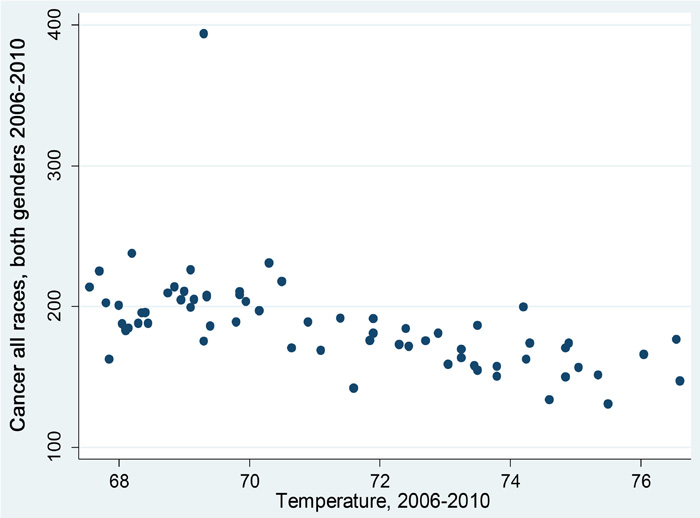| Tweet | Follow @co2science |
Paper Reviewed
Hart, J. 2015. Association between air temperature and cancer death rates in Florida: An ecological study. Dose-Response 13: DOI: 10.2203/dose-response.14-024.Hart.
Negative human health-related impacts of potential CO2-induced climate change have long been a concern of global warming alarmists. Yet over the years, numerous research articles have demonstrated that societies should be much more concerned about the health impacts of cold temperatures than warm temperatures (see, for example, the many reviews we have posted in the various subheadings under Health Effects: Temperature on our website). And now there is one more study to add to this growing list -- a publication by John Hart (2015) that appeared in the journal Dose-Response.
In a fairly straightforward study, Hart set out to examine the relationship between average daily air temperature and cancer death rates at the county level in the U.S. state of Florida over the period 2006-2010. In doing so, he controlled for smoking rates, land elevation and race, using multiple linear regression as the tool for his analysis. And what did the investigation reveal?
As expected, Hart reports that county temperatures increased the further south the county was located toward the equator. In contrast, however, cancer death rates were found to decline as county latitude decreased, such that there was an "apparent beneficial association" between warmer temperatures and cancer death rates (see figure below). Statistically speaking, as determined from the author's Table 2, this "beneficial association" amounts to an average of 4.6 fewer cancer deaths per 100,000 persons in the state of Florida per a 1°F increase in average temperature.

Figure 1. Scatter plot for cancer death rates in Florida counties (all races, both genders) versus temperature over the period 2006-2010 indicating an inverse relationship between temperature and cancer death rates. Source: Hart (2015).
In commenting on these findings, Hart says they were "unexpected, given the dire predictions about global warming." Nevertheless, he adds that "the finding of a benefit from warmer temperatures on the death rates is consistent with a recent report which revealed that warmer temperatures are linked to decreased mortality for cardiovascular disease, strokes, and respiratory disease (Idso et al., 2014)."
Reference
Idso, C.D, Idso, S.B., Carter, R.M. and Singer, S.F. (Eds.) 2014. Climate Change Reconsidered II: Biological Impacts. Chicago, IL: The Heartland Institute.




